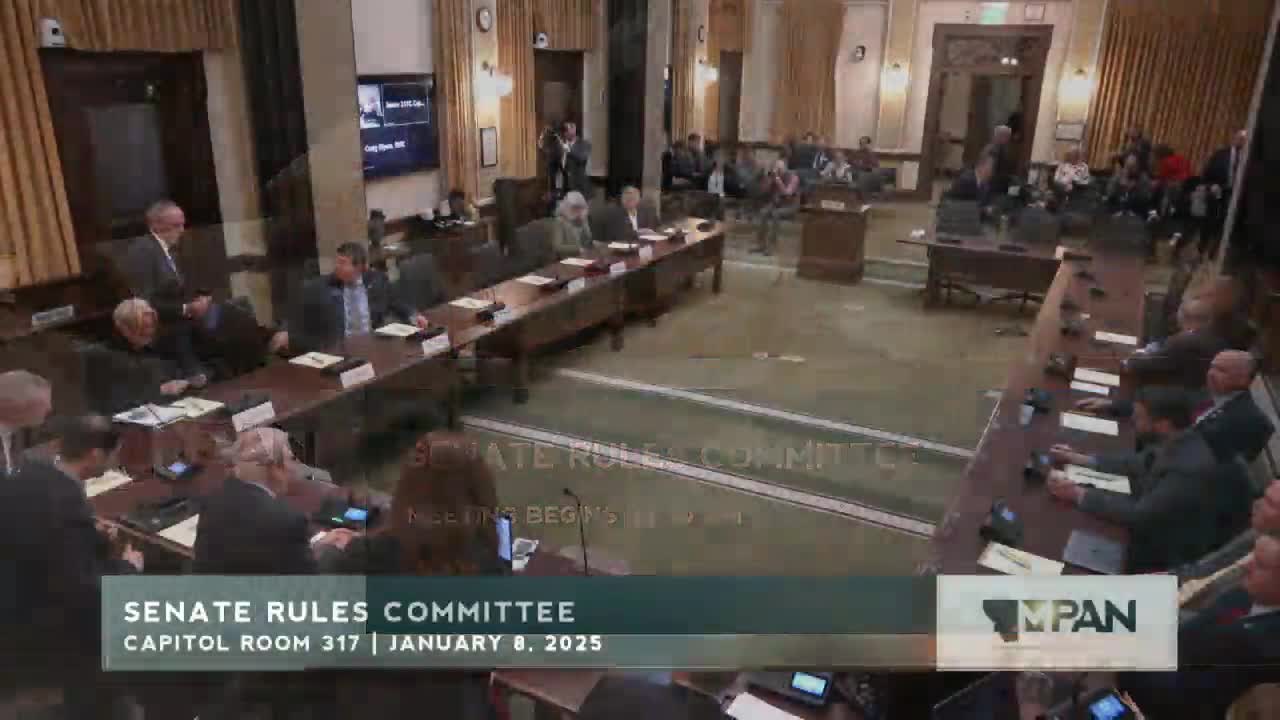Senate rules resolution amended to remove executive-branch review committee; SR 1 passes 10-8
Get AI-powered insights, summaries, and transcripts
Subscribe
Summary
The Montana Senate Rules Committee amended and passed Senate Resolution 1 (SR 1), adopting changes to Senate rules that include assignment of preintroduced bills by the president, limits on debate for the sine die motion, and removal of a proposed executive-branch review committee.
The Montana Senate Rules Committee voted 10-8 to adopt Senate Resolution 1 (SR 1) as amended, removing a proposed executive-branch review committee and confirming several clarifications to the chamber’s rules.
Chair McGillivray opened the rules hearing and asked Vice Chair Mandeville to take over for presentation. Vice Chair Mandeville reviewed substantive changes in the preintroduced rules package, including a provision (s 4020) clarifying that preintroduced bills are assigned to committee by the president; a change to floor privileges (s 2050 and s 2055) that requires a valid floor pass for media access to the floor; a clarification requiring the president to schedule bills for second reading after committee passage (s 4060); new limits on debate for a motion to adjourn sine die (s 5050 and s 5095), and a confirmation requirement for second-term gubernatorial appointments (s 7010 and s 2030).
The committee debated and approved a single amendment, SR0001.001.001, offered during executive action. Vice Chair Mandeville moved the amendment and explained that it would remove the executive-branch review committee from section 3020. "This would remove the executive branch review committee, mister chair," Mandeville said when introducing the amendment. The roll-call on the amendment recorded 10 votes in favor and 8 opposed; the committee chair then moved SR 1 as amended.
The committee completed a roll-call final vote on the resolution as amended; the resolution passed by the same recorded margin, 10-8. Committee members who voted yes on the amendment and final passage included Vice Chair Mandeville, Senator Emmerich, Senator Esp (by proxy), Senator Glynn, Senator Hertz, Senator Lenz, Senator Noland, Senator Usher, Senator Gault (by proxy) and Chair McGillivray. Those recorded as voting no on the amendment and final passage included Senator Boldman, Senator Smith, Senator Ellis, Senator Ellsworth, Senator Flowers, Senator McCamey, Senator Morgeau and Senator Harvey.
Committee business otherwise reiterated the rule clarifications Mandeville summarized. Mandeville said some changes were non‑substantive (for example, language about electronic minutes) and would not be reviewed in detail; he identified the sections above as the substantive updates previously approved in the preintroduced version.
The committee adjourned after confirming the vote and noting a joint rules meeting scheduled for the following day at 1:30 p.m. The hearing record shows no proponents or opponents appeared to speak during the public comment portion; the committee proceeded directly to executive action after a brief recess to distribute copies of the resolution.
